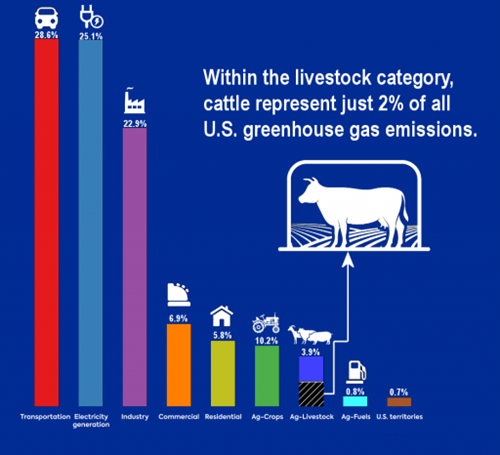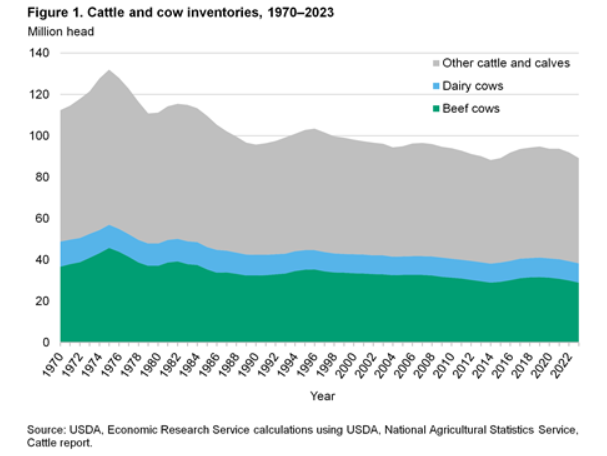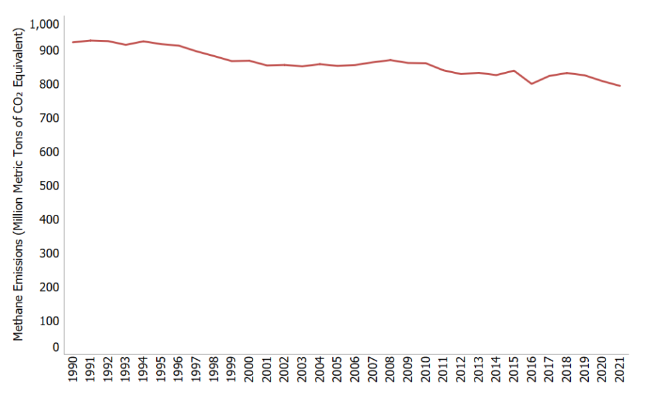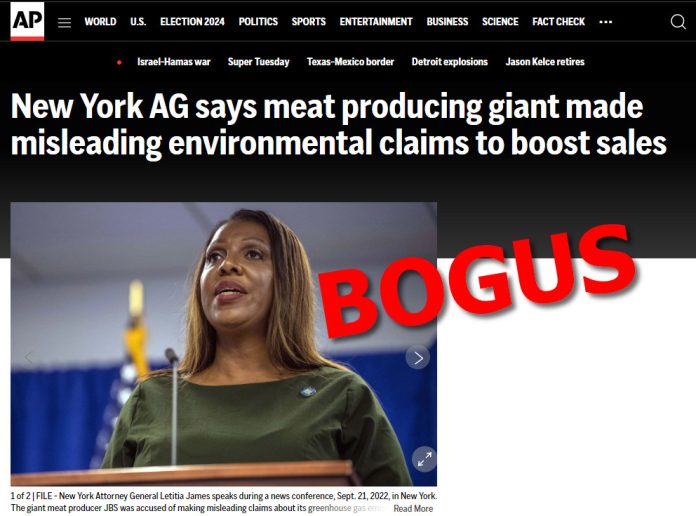A story from The Associated Press (AP) reports that New York’s attorney general Letitia James has filed a lawsuit alleging that a meat producing company, JBS USA, was being misleading when it claimed it will achieve net zero greenhouse gas emissions by 2040. According to the lawsuit, “beef has the highest total greenhouse gas emissions of any major food commodity and beef production is linked to large-scale deforestation.” This claim by James is false, and real-world data proves this to be so.
The Environmental Protection Agency’s (EPA) own data showing beef in particular and farm production in general is not a significant contributor of greenhouse gas emissions. Most climate alarmists immediately cite methane and beef production as a major factor, but the data shows it isn’t really a problem at all. From Climate at a Glance: Livestock and Methane we learn:
Climate activists often claim that ranchers, livestock, and meat production are a leading cause of rising greenhouse gas emissions and global warming. However, the U.S. Environmental Protection Agency (EPA) has compiled information on greenhouse gas emissions by source. According to EPA, beef production accounts for 2 percent of U.S. greenhouse gas emissions, while livestock production accounts for less than 4 percent of U.S. greenhouse gas emissions.
By contrast, U.S. agricultural crop production emits more greenhouse gases than total livestock production.
In the figure below, which looks at all greenhouse gas emissions by sector in the United States, note that beef production is less than half of the entire livestock sector, at just 2 percent. The data comes from EPA publication Inventory of U.S. Greenhouse Gas Emissions
and Sinks, 1990-2022.

Further, note that virtually every other category compiled by the EPA has emissions far greater than that of livestock production. The lawsuit also claims deforestation is a major factor with beef production. The lawsuit apparently does not look at the actual trend in data, which is actually slightly decreasing for beef cows in the United States according to the US Department of Agriculture (USDA) and as seen in figure 2 below.

So with fewer beef cows, requiring less grazing acreage, there’s no possibility for increased deforestation in the United States.
In fact the trend is opposite, according to the USDA, research has found that over the past 20 years, U.S. forests are growing increasingly dense across most of the nation. Also, the World Economic Forum reports that the United States is aiming to plant 1 billion trees over the next 10 years. So even if national beef production was in fact causing deforestation, it will be mitigated.
But James, like many people who don’t have firsthand knowledge of farming or ranching, misses this inconvenient data. Even more inconvenient is the fact that methane emissions in the United States are actually slightly down since 1990 according to this EPA data in Figure 3:

The bottom line is that the lawsuit by James does not have any leg to stand on when it comes to looking at data related to the claims. Beef production has little impact on the total greenhouse gas emissions in the United States, and the issues of methane and deforestation are completely non-starters for such a lawsuit because the actual data is contrary to the claims.
It appears this lawsuit is nothing more than a climate activist looking to create yet another bogus show trial for the benefit of those that think climate change is a crisis and removing beef from the American diet is one of the ways to prevent future catastrophe.


















Exactly another show trial to promote her own agenda and career and blame an industry that is using the means to make their impact on greenhouse gas emissions even less than the small amount it produces now! These people are shameless and have nothing to do but go after people and companies as a shakedown force with no evidence or proof of any wrongdoing! Another slip and fall lawyer trying to con her way into making false accusations to get a settlement! This case has no merit and be summarily dismissed as frivolous and a violation of prosecutorial ethics!
In fact, a 2017 study authored by Robyn White of Virginia Tech found that if all livestock – cows, sheep, hogs – were eliminated, the net effect on American greenhouse gas emissions would be a statistically insignificant reduction of 2.6 percent. “The base expectation is that if we got rid of them, you would basically automatically recoup that greenhouse gas emissions expense, and what we find is that’s not really supported by the simulation that we did,” said White.
The study also showed that Americans would be very unhealthy.
“Compared with systems with animals, diets formulated for the U.S. population in the plants-only systems had greater excess of dietary energy and resulted in a greater number of deficiencies in essential nutrients…. This assessment suggests that removing animals from U.S. agriculture would reduce agricultural GHG emissions, but would also create a food supply incapable of supporting the U.S. population’s nutritional requirements.”
https://the-pipeline.org/the-weak-are-meat-the-strong-do-eat/